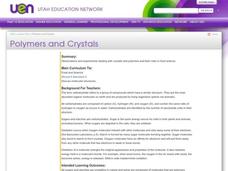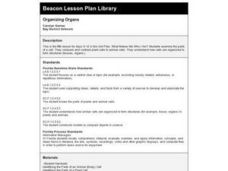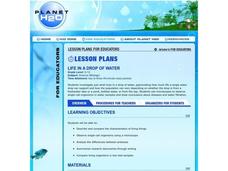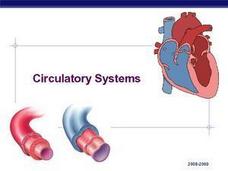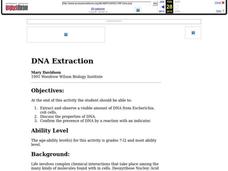Curated OER
Microviewer
In this microviewer worksheet, students observe several types of cells. Students draw each type of cell and label the important parts. Students also answer questions relatable to the cell and the purpose for study.
Curated OER
The Structure of DNA
In this structure of DNA worksheet, students answer several short answer questions applying knowledge about the structure of DNA. Students also match the description to the correct terms.
Curated OER
Cells, The Structural and Functional Units of Life
Students observe the general structure and organelles of plant and animal cells. Students prepare microscope slides of elodea, onion, check, and cork and identify the cells by size and shape as unicellular, multicellular, plant or animal.
Curated OER
Polymers and Crystals: Their Role in Food Science
Blend chemistry with cooking in this exploration of polymers, carbohydrates, and food science. Experimenting with gelatin produces concrete examples of the bonding and ploymerization discussed in the lesson. Copious, comprehensive...
Curated OER
Use of Microscopes and Creation of Slides
Students explore the use of microscopes and the creation of slides. They practice using, adjusting and viewing with a microscope. they view slides of familiar substances such as blood and fibers. In addition, they create slides using...
Curated OER
Organizing Organs
Fifth graders research plant and animals cells and create a Venn Diagram to show the similarities and differences.
Curated OER
Learn DNA Replication
Students explore physical science by participating in a science role-play activity. In this DNA structure lesson, students discuss the different parts of the code that makes up our DNA and instructs our cells. Students utilize the...
Curated OER
Cell-ebrations in Science
Students recognize that all living things are made up of cell and that they cannot easily be seen by the naked eye. Students become familiar with the use of microscopes as a tool for investigation.
Curated OER
DNA: Structure and Replication Movie
In this DNA: structure and replication learning exercise, students fill in the blanks about the structure of DNA and replication of DNA. Students sketch several diagrams of DNA at different stages.
Curated OER
Cell Growth and Division
In this biology worksheet, 9th graders label the diagrams with the appropriate phase of mitosis illustrated. Then they explain why skin cell undergo mitosis continuously. Students also explain why mitosis is a form of asexual reproduction.
Teach Engineering
Solar Angles and Tracking Systems
The sun will continue to rise in the east and set in the west, no matter what. The first instructional activity in a series of eight introduces the class to solar angles. It makes connections between a person's latitude and the angle of...
Curated OER
Science Lessons
Tenth graders research about the different cell organelles. In this series of biology lessons, 10th graders compare two allotropes of carbon. They investigate how the rate of reaction is affected by concentration.
Curated OER
Life in a Drop of Water
Students examine the structure, function, and characteristics of microscopic organisms that inhabit freshwater through collection of water samples and observation through microscopes.
Curated OER
Gas Exchange And Respiratory Systems.
Explore structures within the realm of gas exchange in terrestrial and aquatic life. The excellent, labelled diagrams and clear descriptions help your students view the different structures and adaptations that have developed. The 29...
Curated OER
Circulatory Systems
Excellent diagrams, labels and summaries make this resource be valuable to your students throughout the topic of circulation. All types of circulation vessels are explained, their structure and function is detailed, and the overall...
Curated OER
Muscles and Motor Locomotion
This is a fabulous presentation which should reinforce all aspects of muscle construction on a gross anatomical and micro level. There are slides to help understanding with the muscle fiber anatomy, and many labelled diagrams to explain...
Curated OER
Circulatory Systems
A slideshow that covers the all-important details related to basic human circulation. The reasoning for exchange of material methods is presented and then labeled diagrams of the main human transfer systems are shown, along with...
Curated OER
Fungi
Why did the mushroom go to the party? Because he was a fun guy! Biology learners study fungi while completing this worksheet. Structure is compared to that of other life forms. The life cycle is displayed with colorful diagrams for...
Curated OER
Teaching Biology Through Bioinformatics
Wow! A very detailed slideshow covers complex topics of genome research methods. This is advanced and relevant to the highest level of school biology. Excellent resource if you wish to expose your class to scientific methods and...
Curated OER
DNA Extraction
Students are able to extract and observe a visible amount of DNA from Escherichia coli cells. They discuss the properties of DNA. Students confirm the presence of DNA by a reaction with an indicator.
Curated OER
AP Biology Lab Review
A seventy-two slide PowerPoint that reviews several lab explorations done in an AP Biology course. For each lab there is a description, concepts, and conclusions. Many pictures and graphics make this visually appealing, but it would not...
Curated OER
Label the Neuron
In this neuron worksheet, 7th graders study the definitions for the neuron and then label the neuron diagram with the terms.
Curated OER
Electrochemistry Test Review
This review sheet will be very useful to test your pupils' understanding of battery structure and redox reactions. The questions ask for equations to be balanced and for the traditional equipment setups to be drawn and labeled. The...
The Science Spot
Flower Basics
Learn about plants and pollination with a learning exercise about the parts of a flower. After labeling the anatomy of a flower using a word bank, kids explain the difference between self-pollination and cross-pollination, and unscramble...





